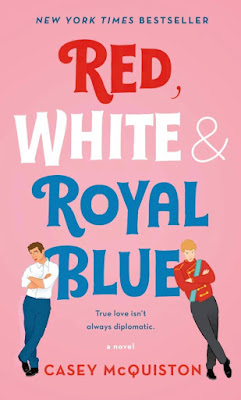The Buck(ingham) Stops Here!
James and I read about this book on some listicle back in February while we were on our way to Martha's Vineyard. I remember the description said something about this being covered all over the place during the summer of 2019 and if you didn't know about this love story between the Prince of Wales and the First Son of the United States you weren't paying attention. I really don't know how I missed it. I see the book trade magazines regularly come across my desk, and this is exactly the kind of book that would have caught my eye. But here we are.
Anyway, since the trip to the "Vineyard" was pre-pandemic the local bookstore (Bunch of Grapes) was still open. We went in and purchased it with the intent that we would read it together. The story takes place in the present day in a parallel universe in which there is no pandemic, and the country isn't being run by a completely incompetent president.
What starts as a bro-mance orchestrated for the press turns into a full on love affair when the biracial, bisexual son of the first woman president of the United States falls for Henry, the gay Prince of Wales. Not prepared to come out to their families, much less the rest of the world, the two manage their long-distance romance by making up reasons to hop across the Big Pond, as well as via chat messages and e-mail. When their steamy electronic messages get leaked to the press the two find themselves in a true diplomatic nightmare for the White House and the Crown. Can these two millennials make history with an international sex scandal?
The real nail biter for me, though, was wondering if these two would ever use a library. James and I very much enjoyed reading this, and I was truly worried that it would not find a place on this blog, as the first time a library is even mentioned is not until page 386 (of 418) and that was simply as a place that was nixed as venue for the official royal "courtship photos".
Alex has to admit, the royal photographer is being exceedingly patient about the whole thing, especially considering that they waffled through three different locations-Kensington Gardens, a stuffy Buckingham Palace Library, the courtyard of Hampton Court Palace-before they decided to screw it all for a bench in a locked-down Hyde Park.There is a nod to the intellect of these two by way of "a pile of books" stacked up next to the bench in the photos. The use of the indefinite article in front of "stuffy Buckingham Palace" caused James to wonder aloud just exactly how many libraries there are in the palace, and for me to follow up with, "and just how many of those are stuffy?"
Interestingly, after making me wait until the book was almost done to satisfy my frustration, the author manages to sneak in one more mention of a library - the Library of Congress of course - on page 415.
This is truly a fun romance about a well-matched pair. Equal in good looks, intellect, and political power there's no trite story about a prince pretending to be just a regular guy, or a poor admirer hoping the prince will notice them. Only the use of a library could have formed a more-perfect union between these two.
We started reading this just about the time that our governor issued the stay-at-home order for Massachusetts, and we read a bit each day. It was the perfect antidote to our work-at-home days - a little daily vacation when we could forget about what was going on in the rest of the world and simply have a laugh together.
Sexy, smart satire. Read it with someone you love.



